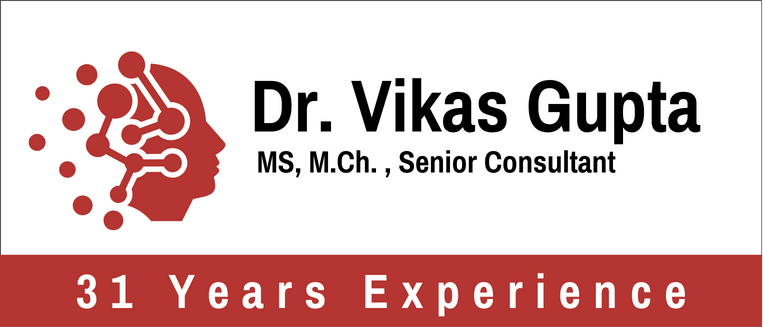
Brain tumor surgery is a surgical procedure to remove a tumor or part of a tumor in or around the brain. Around the world, millions of people are dealing with the difficulties of brain tumors, and having surgery is a big part of getting better.
Although brain tumor treatment without surgery is possible, in many cases, surgery provides the best opportunity for positive outcomes, relieving symptoms and improving the life span of the patient. The recovery period after brain tumor surgery can look different for each patient because the type of brain tumor, your overall health, and the type of surgery determine it.
Dr. Vikas Gupta, a renowned expert in neurosurgery, specializes in compassionate care for brain tumor patients. With a focus on individualized treatment plans, Dr. Vikas employs advanced surgical techniques to ensure optimal outcomes. His expertise extends to post-surgery recovery, emphasizing comprehensive support for patients, aiding them on their journey to healing and improved quality of life.
This guide is here to help you understand what happens after the surgery.
Immediate Post-Surgery Period
Right after brain tumor surgery, you may experience a range of emotions and physical effects. Feeling tired, disoriented, or even a bit anxious is common. The immediate post-surgery period involves closely monitored care in the hospital, where medical professionals will closely monitor your vital signs and overall well-being.
Recovery Timeline
The length of the recovery period depends in part on the type of surgery. Table 1 outlines the average recovery time for three common brain tumors: pituitary tumors, meningiomas, and acoustic neuromas.
| Brain Tumor Type | Recovery Time |
| Pituitary Tumor |
|
| Meningioma |
|
| Acoustic Neuroma |
|
Physical Recovery
Physical therapy plays a vital role in the recovery process. A physical therapist will work with you to regain strength, coordination, and balance. These sessions are tailored to your needs and may involve exercises to improve mobility and reduce stiffness. While progress may seem slow initially, consistency is vital to a successful physical recovery.
Emotional and Psychological Support
Coping with the emotional and psychological aspects of brain tumor surgery recovery is equally important. It’s not uncommon to experience a range of emotions, including anxiety or even depression. Seeking support from mental health professionals, joining support groups, or leaning on friends and family can provide the emotional support needed during this challenging time.
Cognitive Rehabilitation
Brain tumor surgery can sometimes impact cognitive functions. You may need help with memory, concentration, or problem-solving. Cognitive rehabilitation, often led by specialists, focuses on exercises and strategies to enhance cognitive abilities. Patience and persistence are essential as you work towards regaining cognitive function.
Managing Symptoms and Medications
Depending on the type and location of the tumor, you may need to manage specific symptoms post-surgery. This could involve pain management, anti-seizure medications, or other medications to address potential side effects. Understanding your medication regimen and communicating concerns with your healthcare team is crucial for effective symptom management.
Nutritional Considerations
Nutrition plays a vital role in the recovery process. Your body needs adequate nutrients to heal and regain strength. While individual dietary needs may vary, focusing on a well-balanced diet rich in fruits, vegetables, lean proteins, and whole grains can contribute to overall recovery. Consult with a nutritionist or your healthcare team for personalized guidance.
Follow-up Care and Monitoring
After the initial recovery period, regular follow-up appointments with your healthcare team are essential. These appointments allow your medical professionals to monitor your progress, address any concerns, and adjust your treatment plan if necessary. Open communication with your healthcare team ensures you receive the ongoing support needed for a successful recovery.
Dr. Vikas Gupta emphasizes, “We tailor rehabilitation plans to individual needs, addressing the challenges that may arise. It’s not just about surgery; it’s about holistic recovery. With proper care, support, and a multidisciplinary approach, we aim to guide patients towards a successful post-surgery phase, ensuring the best possible outcomes.”
A happy and satisfied patient of Dr. Vikas Gupta expressed, “Recovering from brain tumor surgery was challenging, but Dr. Vikas Gupta and his team provided unwavering support. The tailored rehabilitation plan addressed both physical and emotional aspects. The nutrition and follow-up care guidance reinforced my confidence in the recovery process. Grateful for a compassionate and comprehensive approach that made a significant difference in my healing journey.”
What Is The Cost Of Brain Tumor Surgery In India?
The cost of brain tumor surgery in India can vary widely, ranging from approximately ₹3,00,000 to ₹10,00,000 ($4,000 to $13,500). Factors influencing costs include the hospital, surgeon’s expertise, and the type of surgery required. Prices may fluctuate based on geographical location and additional medical services provided.
Conclusion
Recovery from brain tumor surgery is a journey that requires time, patience, and a multidisciplinary approach. Understanding what to expect, seeking emotional support, and actively participating in your recovery can significantly enhance healing. Remember, you’re not alone – a network of healthcare professionals, friends, and family supports you every step of recovery.
FAQs:
Q: How long does the immediate post-surgery monitoring period last?
A: The duration varies but typically involves a few days of closely monitored care in the hospital.
Q: Is cognitive rehabilitation necessary for every brain tumor surgery patient?
A: Not necessarily, but it depends on the impact on cognitive functions, and specialists may recommend it as needed.
Q: Can I return to regular activities immediately after brain tumor surgery?
A: It varies based on the type of surgery. Physical recovery and return to normal activities can take weeks to months.
Q: Are follow-up appointments crucial even if I feel fine after surgery?
A: Regular follow-up appointments are essential for monitoring progress and addressing potential concerns.
Q: Is the cost of brain tumor surgery in India inclusive of all medical services?
A: No, additional factors like geographical location, hospital choice, and specific medical services may influence the overall cost.
Read More : What Are The Postoperative Steps After Brain Tumor Surgery?
